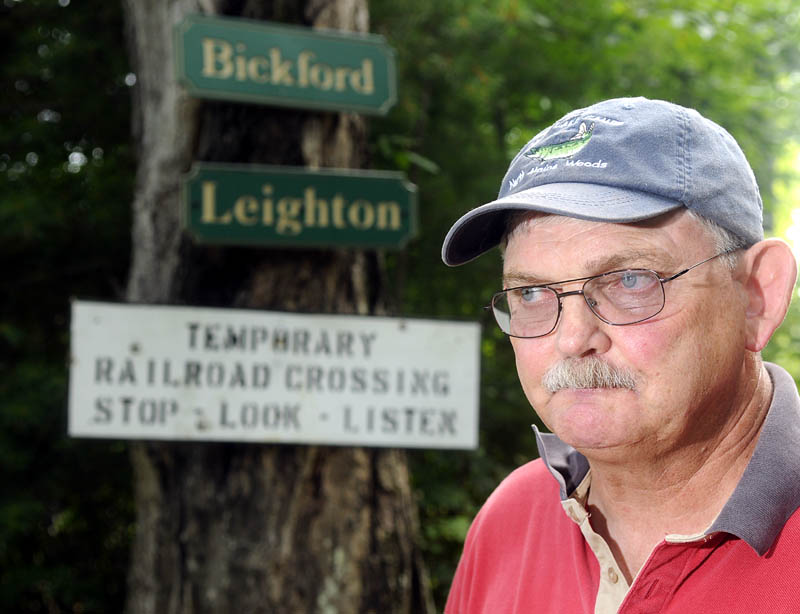BELGRADE — Camp owners and others vented frustration at railroad officials Tuesday night during a discussion of proposed fee increases at railroad crossings and a requirement that residents who have to cross the tracks on private roads to get to their homes buy liability insurance.
More than a dozen residents showed up at the North Belgrade Community Center to ask Pan Am Railways representatives about the proposal. At times, with voices raised, the residents interrupted each other and cut off the attorney and spokeswoman for the railroad.
The residents are concerned that, in some instances, annual maintenance fees charged to those who cross the railroad on private roads could jump from $75 a year to $1,500. Others who were not paying a fee were sent letters telling them to now pay $490 a year.
Some described Belgrade as a pilot project and warned that increased fees at private crossings along the railroad’s 1,200 miles of track in Maine will be assessed in other places.
“You’re trying to squeeze $40,000 a year out of us,” said Edward Pearl of Oakland. “You’ve decided to squeeze the hell out of the little people. You’re doing it to us because we don’t have the money to fight you.”
Pan Am Executive Vice-President Cynthia Scarano started the meeting by apologizing to the residents for letters sent in February calling for new fees and liability insurance in case of accidents at the crossings.
“We’re sorry about the surprise,” she said.
The company is primarily concerned about potential lawsuits arising from accidents, and wants to work with state lawmakers to find a solution. As it is now, state law exempts liability for accidents that occur at crossings used for recreation. The railroad wants the Legislature to expand that to cover residential use.
The proposal to increase fees has been simmering for months, with state Rep. Dennis Keschl, R-Belgrade, and House Speaker Robert Nutting, R-Oakland, holding meetings with railroad officials off and on, Keschl said.
Keschl, a former town manager for Belgrade, estimates there are 15-20 private road crossings in Belgrade and about 100 home and camp owners who could be affected by a change in fees or insurance requirements. Similar changes could be proposed in other cities and towns in Maine along the rail line, which runs roughly from North Berwick to Mattawamkeag.
One resident, Dick Bickford, brought his own attorney to the meeting. Others challenged Scarano to be more specific about what the railroad wants.
Kayak Lane resident Burc Oral said the railroad was being murky about its plans.
“What if I decide I am not going to pay?” he asked. “Are you going to block me from going in to my house? What about the entire state of Maine? There are thousands of people crossing it.”
Scarano said the railroad estimates that they need to charge residents at least $350-$500 a year per crossing to cover maintenance costs. But she said the issue is complicated because some property owners have deeded rights of way, others have farm crossings and some are seasonal crossings. That makes it difficult to charge a set amount for each property owner.
The railroad also recently completed upgrades to that stretch of line so it can better serve paper companies, she said. Because of increased capacity, they are now able to transport oil and other goods at higher speeds.
Some residents said the railroad neglected to maintain the line for years and now expect residents to help pay for improvements that will help the company increase its profits.
Pan Am Railways, with a home office in Massachusetts, has track in Maine that runs through Portland and Bangor, and has spurs that run to Brunswick, Rumford, Augusta, North Anson and Bucksport.
Scarano said the company first wants to pursue state legislation and will then revisit the fee scale. That gives residents several months before they could see any changes. The issue first cropped up in Belgrade because the company hired an engineer “and this is where she started,” Scarano said.
Pearl, who lives in nearby Oakland, said many potentially affected by increased costs are scared.
“A lot of us are retired,” he said. “We can’t afford this. To come in and tap us for forty grand a year? It’s criminal.”
Send questions/comments to the editors.


